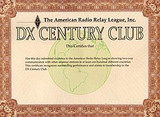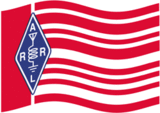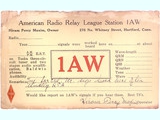DXCC - DX Century Club
 The DXCC List is based upon the principle espoused by Clinton B. DeSoto, W1CBD, in his landmark 1935 article, "How to Count Countries Worked, A New DX Scoring System". In DeSoto's words, "The basic rule is simple and direct: Each discrete geographical or political entity is considered to be a country". This rule has stood the test of time -- from the original list published in 1937 to the ARRL DXCC List of today. For more than 60 years, the DXCC List has been the standard for DXers around the world. DeSoto never intended that all DXCC "countries" would be countries in the traditional, or dictionary, meaning of the word. Rather, they are the distinct geographic and political entities which DXers seek to contact. Individual achievement is measured by working and confirming the various entities comprising the DXCC List. This is the essence of the DXCC program. DXCC activity was interrupted by World War II. In 1947, the program started anew. Contacts are valid from November 15, 1945, the date US amateurs were authorized by the FCC to return to the air.
The DXCC List is based upon the principle espoused by Clinton B. DeSoto, W1CBD, in his landmark 1935 article, "How to Count Countries Worked, A New DX Scoring System". In DeSoto's words, "The basic rule is simple and direct: Each discrete geographical or political entity is considered to be a country". This rule has stood the test of time -- from the original list published in 1937 to the ARRL DXCC List of today. For more than 60 years, the DXCC List has been the standard for DXers around the world. DeSoto never intended that all DXCC "countries" would be countries in the traditional, or dictionary, meaning of the word. Rather, they are the distinct geographic and political entities which DXers seek to contact. Individual achievement is measured by working and confirming the various entities comprising the DXCC List. This is the essence of the DXCC program. DXCC activity was interrupted by World War II. In 1947, the program started anew. Contacts are valid from November 15, 1945, the date US amateurs were authorized by the FCC to return to the air.
DXCC Criteria
 The ARRL DXCC List is the result of progressive changes in DXing since 1945. Each entity on the DXCC List contains some definable political or geographical distinctiveness. While the general policy for qualifying entities for the DXCC List has remained the same, there has been gradual evolution in the specific details of criteria which are used to test entities for their qualifications.
The ARRL DXCC List is the result of progressive changes in DXing since 1945. Each entity on the DXCC List contains some definable political or geographical distinctiveness. While the general policy for qualifying entities for the DXCC List has remained the same, there has been gradual evolution in the specific details of criteria which are used to test entities for their qualifications.
- Entity: A listing on the DXCC List; a counter for DXCC awards. Previously denoted a DXCC "Country."
- Criteria: For inclusion in the DXCC List, certain conditions must be met.There are five parts to the criteria: Political Entities, Geographical Entities, Special Areas, Ineligible Areas, Removal Criteria.
ARRL - American Radio Relay League
 The ARRL is a not-for-profit organization that: promotes interest in Amateur Radio communications and xperimentation; represents US radio amateurs in legislative matters; and maintains fraternalism and a high standard of conduct among Amateur Radio operators.
The ARRL is a not-for-profit organization that: promotes interest in Amateur Radio communications and xperimentation; represents US radio amateurs in legislative matters; and maintains fraternalism and a high standard of conduct among Amateur Radio operators.
At ARRL headquarters in the Hartford suburb of Newington, a staff of 120 helps serve the needs of members. ARRL is also International Secretariat for the International Amateur Radio Union, which is made up of similar societies in 150 countries around the world.
ARRL publishes the monthly journal QST, as well as newsletters and many publications covering all aspects of Amateur Radio. Its headquarters station, W1AW, transmits bulletins of interest to radio amateurs and Morse code practice sessions. The ARRL also coordinates an extensive field organization, which includes volunteers who provide technical information for radio amateurs and public-service activities. In addition, ARRL represents US amateurs with the Federal Communications Commission and other government agencies in the US and abroad.
ARRL Homepage: ![]() ext. Link
ext. Link
Mega DX-peditions Honor Roll
![]() Jari, OH2BU has begun in the 90s to compile a list of all DXpeditions that have reached more than 30,000 QSOs . In the 90's 40 DXpeditions qualified. Jari has maintained this list in Excel, and we wanted to someday make it public. Later on I expanded the list, packed it in a database, and added QSLs. We now have 221 DXpeditions from 131 different DXCC entities. We keep a record of DXpedition world records, leaderboards by bands, modes and continents, operator list and much more. - Bernd DF3CB / BCC
Jari, OH2BU has begun in the 90s to compile a list of all DXpeditions that have reached more than 30,000 QSOs . In the 90's 40 DXpeditions qualified. Jari has maintained this list in Excel, and we wanted to someday make it public. Later on I expanded the list, packed it in a database, and added QSLs. We now have 221 DXpeditions from 131 different DXCC entities. We keep a record of DXpedition world records, leaderboards by bands, modes and continents, operator list and much more. - Bernd DF3CB / BCC
Link: ![]() ext. Link
ext. Link


